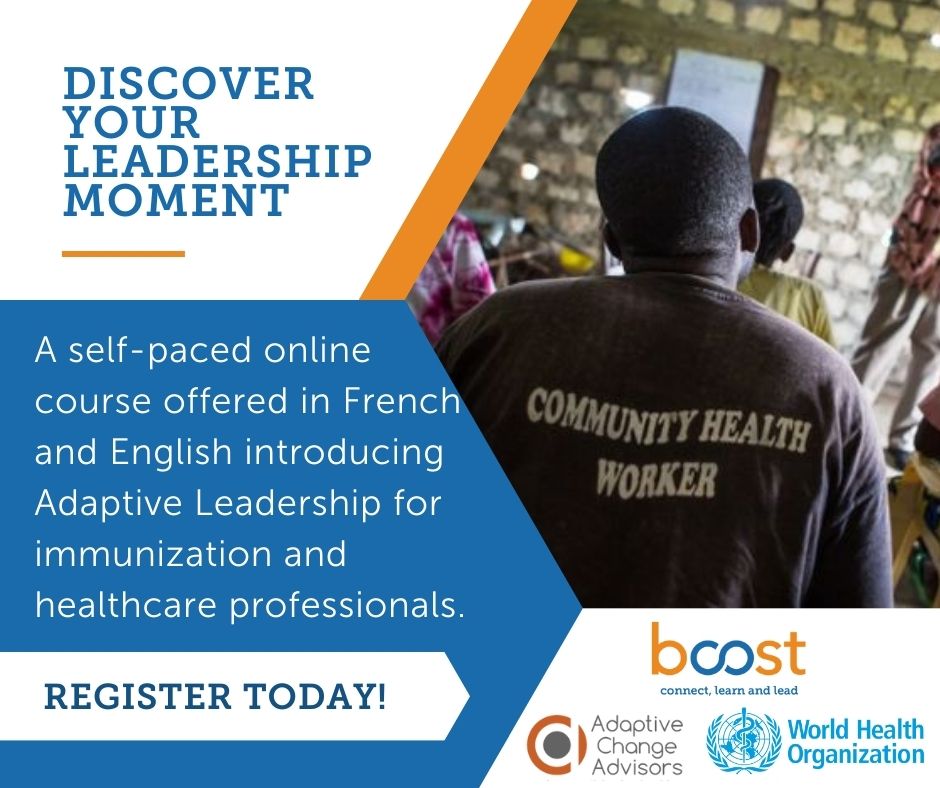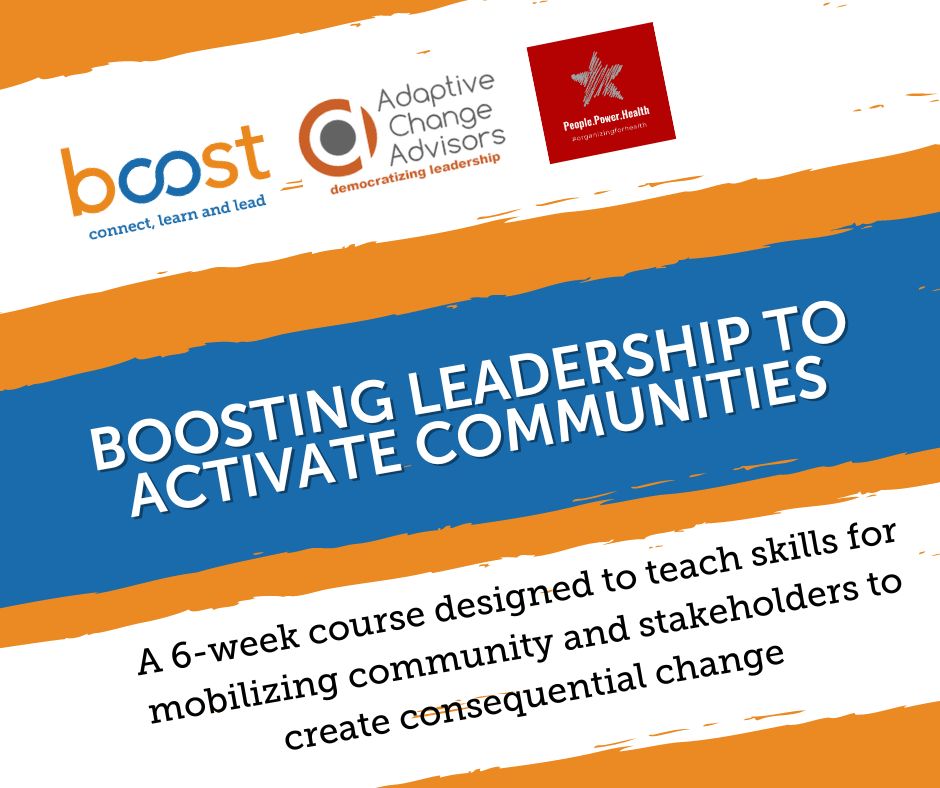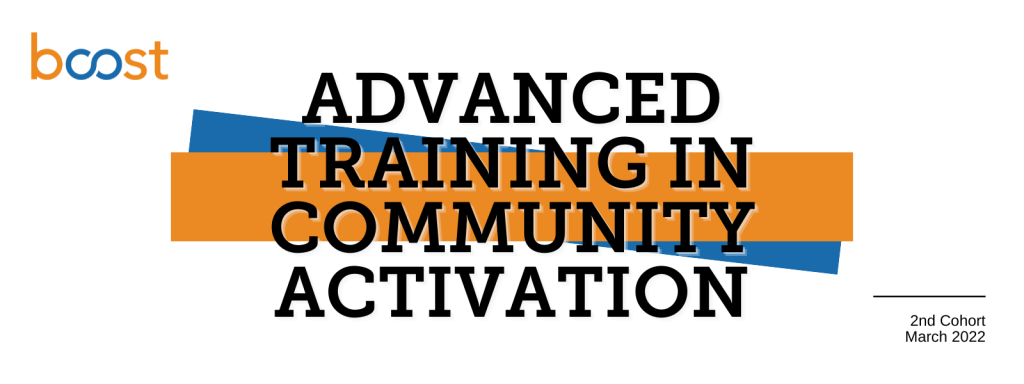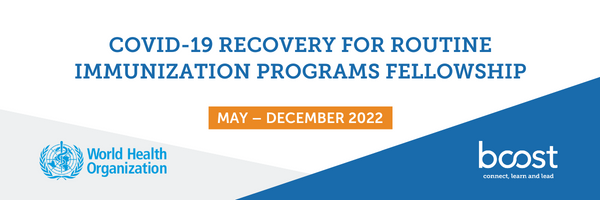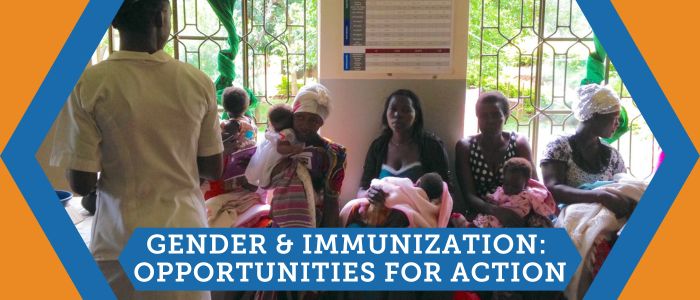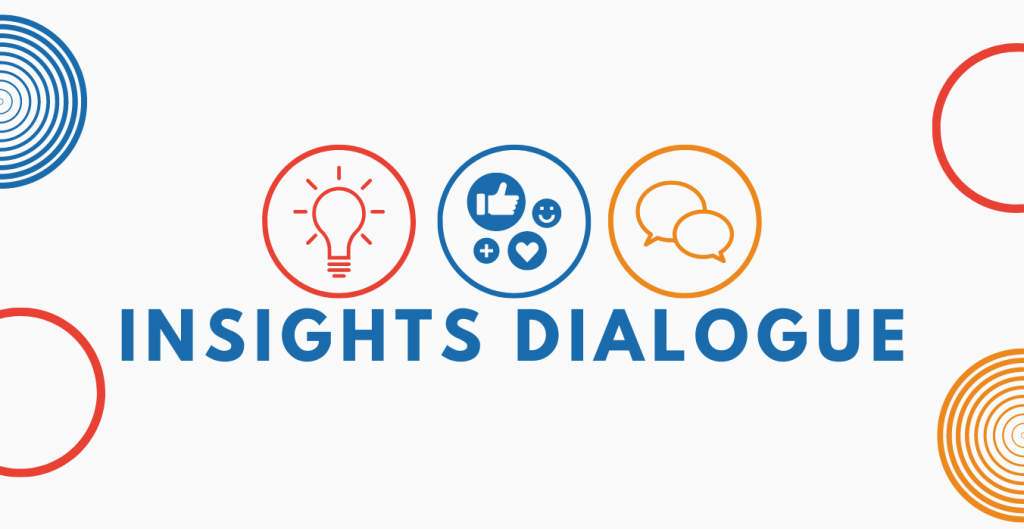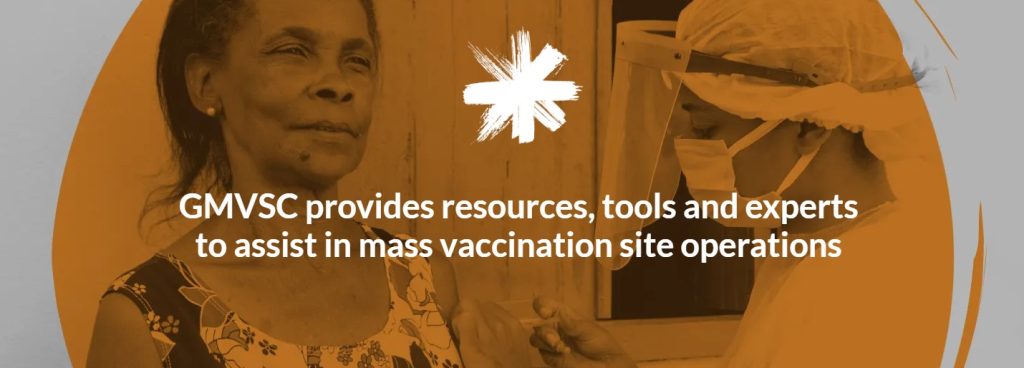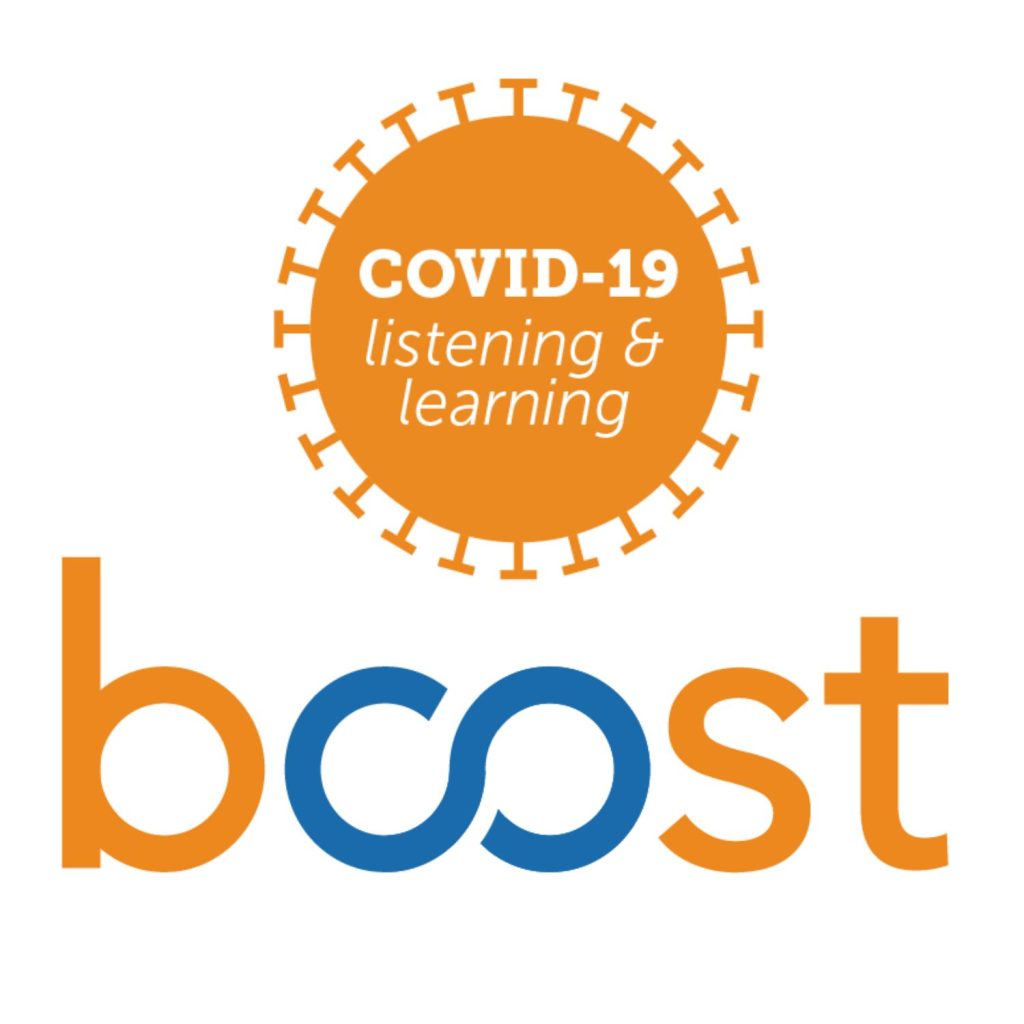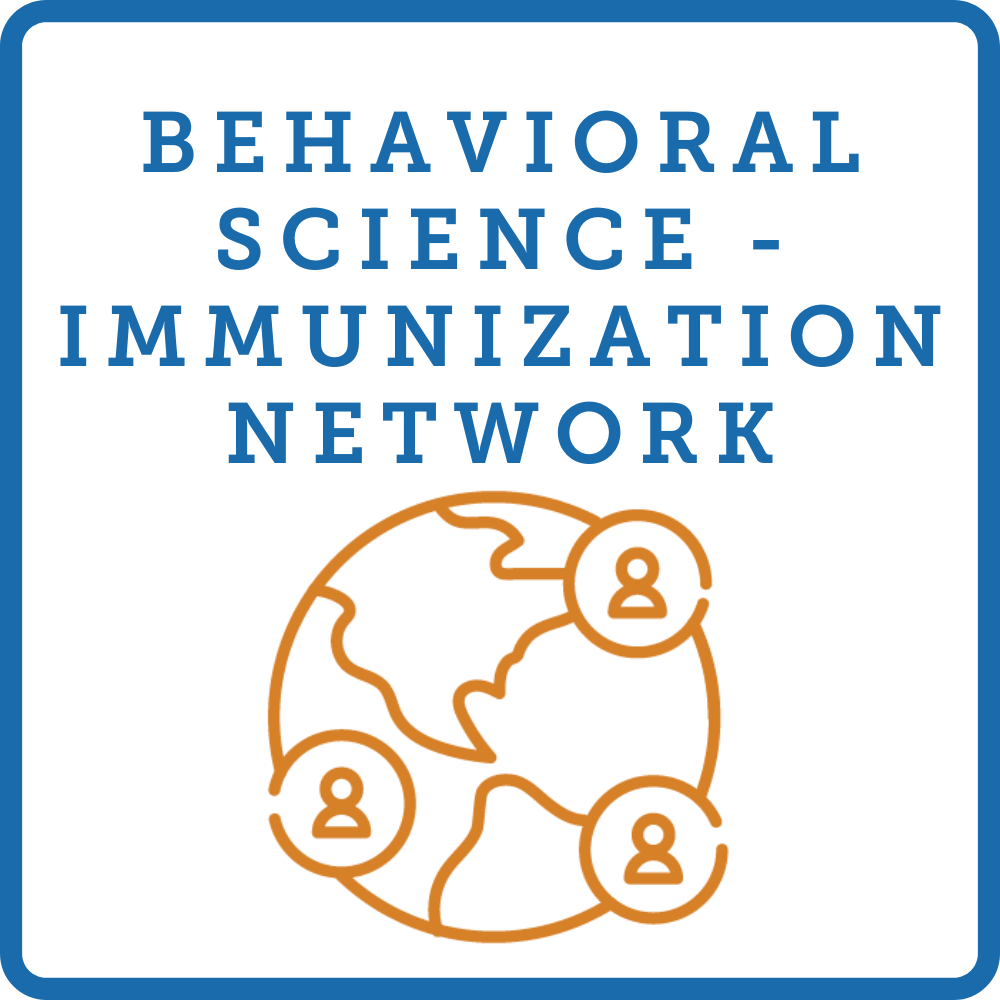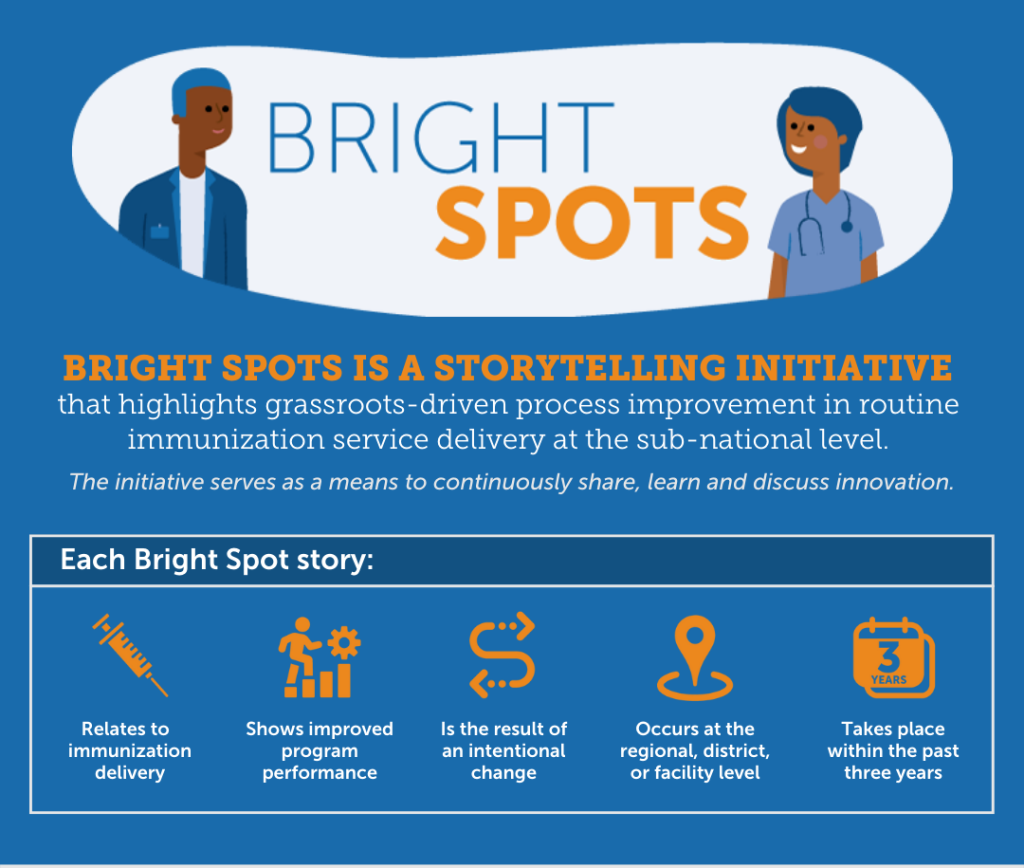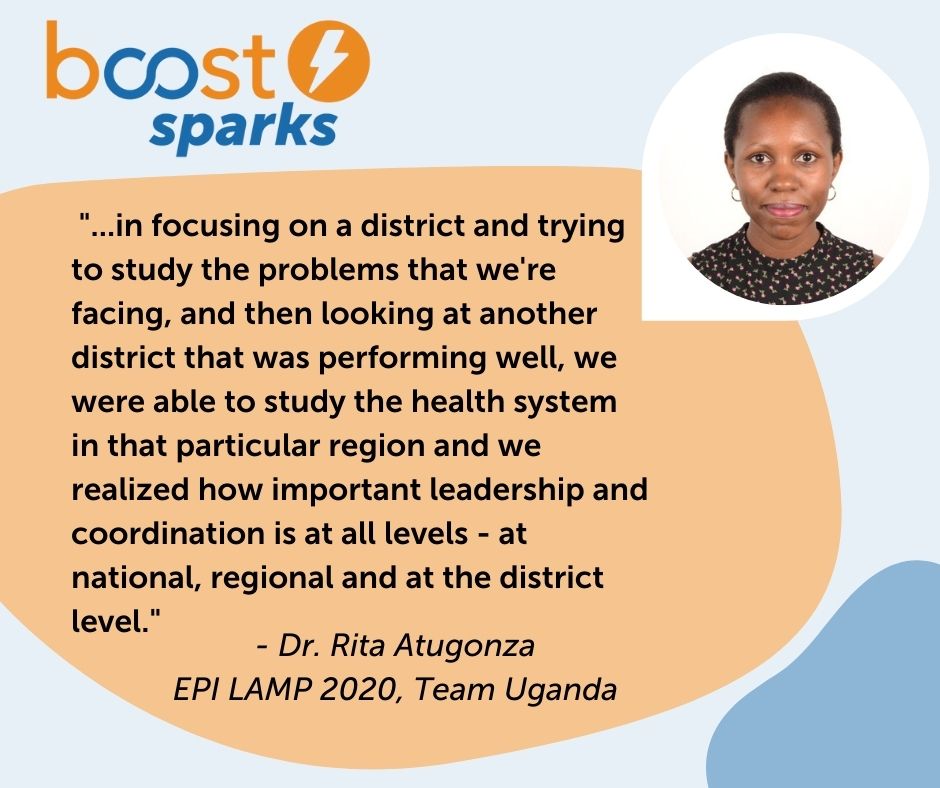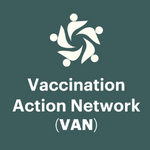Boost 2022 Annual Report
Boost’s mission is to foster a global community that enables immunization professionals to connect with peers and experts, learn skills that build capacity and advance careers and lead immunization programs in challenging contexts.
2022 was another year of significant growth for the Boost Community and for opportunities for Boost Community members to connect, learn, and lead. This report shares highlights from 2022 and a look at what is to come in 2023 and beyond.
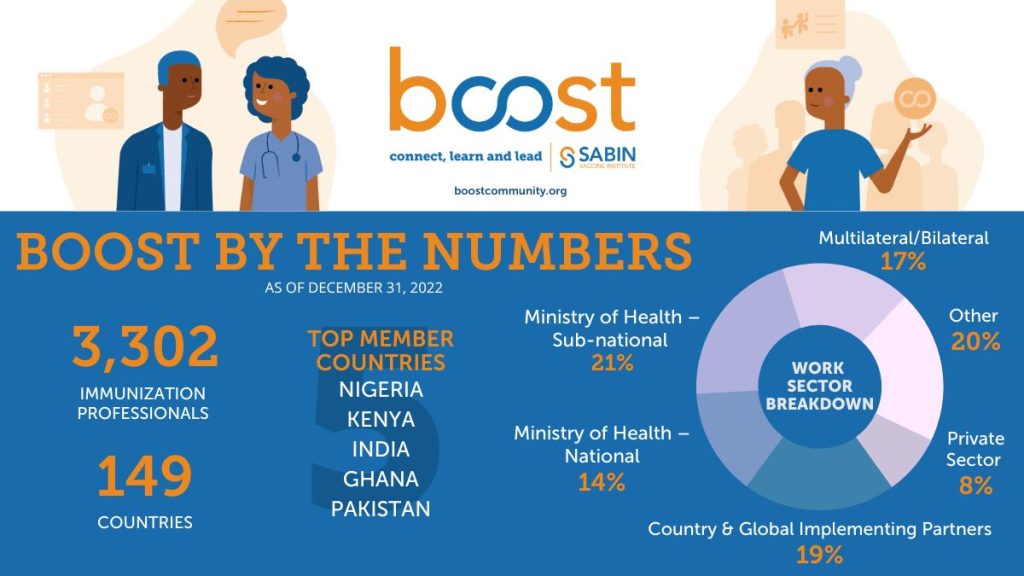
Boost 2022 Total Reach
78% increase in active Boost members from 1855 activated profiles at the end of 2021 to 3302 activated profiles at the end of 2022
16 new countries introduced in 2022 for a total of 149 countries represented by the Boost Community by the end of 2022.
59% increase in Boost platform page views, from 71,318 in 2021 to 113,165 in 2022.
36% increase in Boost platform visitors, from 13,164 in 2021 to 17,944 in 2022.
2022 Highlights: Boost Community Learning and Leadership Programs
One of Boost’s primary objectives is to deliver tailored blended learning opportunities for immunization professionals that enhance their core competencies, with a particular emphasis on leadership, advocacy, and problem-solving skills. In 2022, Boost continued offering learning opportunities such as courses, webinars, interactive workshops, and small group discussions facilitate engaging and meaningful exchange among Boost members.
Throughout 2022, Boost continued to provide access to critical tools and resources. In addition to sharing out partner resources, Boost has worked to create a number of different learning groups. These groups are either topic-specific or provide space for alumni of previous courses to connect with one another. At the end of 2022, Boost hosted 33 active learning groups, compared to original 10 in 2021.
Boost’s Foundational Core Programming
Introductory Courses
Discover Your Leadership Moment
In February 2022, Boost, in partnership with Adaptive Change Advisors, launched a new introductory course on the OpenWHO platform titled, “Discover Your Leadership Moment.” This self-paced virtual course aims to strengthen participants’ capacity to lead consequential, “adaptive” change in challenging and uncertain contexts, such as the COVID-19 pandemic. As of July 27, 2022 the course had 11,780 learners, who have either successfully completed or enrolled in the online course. To date, this course has attracted the most participants of all Boost course offerings, thanks largely to Boost’s partnership with WHO in promoting the course.
Storytelling for Change
Boost and People Power Health partnered together to create this 5-week self-paced online course grounded in the practice of social movements and activism, which provides an opportunity to learn new skills in developing stories that inspire others to join us in taking action. Three cohorts (two in English and French) of Storytelling for Change ran in 2022, with a total number of course completers of 57.
Intermediate Courses
Boosting Leadership to Activate Communities
This intermediate-level course in adaptive leadership and community organizing ran November-December 2022, offering immunization and other health care professionals new approaches to lead and drive health promotion initiatives and projects. Combining the concepts and skills of adaptive leadership and community organizing, which have been developed at Harvard University for over 30 years, participants are taught skills for mobilizing community and stakeholders to create consequential change. For the November 2022 cohort, more than 100 participants completed all course requirements to earn a certificate of completion.
Advanced Trainings
Boost’s Flagship Fellowship Program
Established in 2021, Boost’s Flagship Fellowship program, co-led by People Power Health and Adaptive Change Advisors, is a virtual intensive training with two parts: The first part, Advanced Training in Community Activation, is focused on building, developing and deepening the cohort’s leadership skills for advocacy and community organizing. The second part, an Adaptive Leadership Train-the-Trainer Workshop, focused on mastering adaptive leadership skills through an intensive four-day workshop. Fellows participated in intensive workshops and small group meetings with the goal of recognizing and analyzing opportunities for advocacy and community organizing in their work and preparing to become Boost Community Champions.
The second cohort introduced a new nomination process, which solicited recommendations of fellows from key Boost partners and former fellows. As a result, 26 highly qualified immunization professionals (half of whom were women) from 10 LMICs were accepted into the fellowship program, which officially kicked off March 2022.
In Q3-Q4 of 2022, Boost partnered with People, Power, Health to perform a tracer study to evaluate the impact of Boost’s core programming in adaptive leadership and community activation on both cohorts of fellows. Of the nearly 70% of Boost Flagship Fellowship alumni who participated in the study, over 85% noted that they continue to draw on the tools, skills, and concepts from the program.
Respondents also shared examples of how they were using these skills to improve vaccination coverage. For example, one Fellow working at the subnational level in Ghana reported that after starting COVID-19 vaccination in 2021, by May of 2022, only 3 members of a target community had accepted the vaccine. In June of 2022, this Fellow led a campaign using “storytelling and relationship-building effectively, and at the close of that day, 51 people accepted vaccination. The same activities were repeated in four other highly resistant communities, and we had a breakthrough and our vaccination coverage improved.”
“[The Fellowship] has impacted me a lot. It has improved serial adaptive challenges we used to have before adopting the skilled method and this has increased the uptake of immunization and reduced dropout rate.”
– Boost Flagship Fellowship Alumni
Additional 2022 Learning & Leadership Programming
COVID-19 Recovery for Routine Immunization Programs Fellowship
Boost’s partnership with the World Health Organization (WHO) focused on recovering and strengthening routine immunization programs during the COVID-19 pandemic. The COVID-19 Recovery for Immunization Programs Fellowship officially launched in May 2022, attracting more than 1,200 Anglophone and Francophone applicants from 97 countries. The fellowship began with an eight-part weekly live engagement series on topics such as integration and life course immunization, which culminated with fellows (494 unique participants per session, on average) using what they learned during these sessions to craft and submit either a prospective strategic proposal or retrospective case study in early July. Those submissions (192 total) were reviewed by a team of WHO, Gavi and UNICEF immunization experts and a select cohort (30 individuals) were chosen to participate in the second part of the fellowship: a 6-month mentorship program to help fellows revise and implement their strategic COVID-19 recovery plans or publish their case studies. The program concludes March 31, 2023 when mentees submit their final reports, demonstrating the impact of their proposals or publication of their case studies.
Gender & Immunization: Opportunities for Action
From June to July 2022, Boost partnered with the USAID-funded MOMENTUM Routine Immunization Transformation and Equity project to convene a four-week virtual short-course on gender and immunization with the goal of increasing immunization professionals’ competencies and confidence around planning and developing gender-aware and -transformative activities to improve equity in immunization. During this course, participants learned how to identify and address gender-related barriers to immunization efforts. Out of 214 active participants, 90 participants completed all requirements – which included attending every session and submitting weekly homework assignments – to earn a certificate of completion and demonstrating their readiness to join a growing cadre of committed and capable professionals working to recognize and reduce gender-related barriers to equitable immunization.
Vaccination Action Network
The Vaccination Action Network (VAN) is an Africa-led action-oriented collaborative, that aims to understand issues of vaccine ‘demand’, build networks of peer learning and identify fundable projects to catalyze demand for COVID-19 vaccination in Africa. Sabin developed and led VAN’s Cross-Country Peer-to-Peer Learning Network, launched in May 2022, engaging with 88 members (MoH officials and their designated participants at both the national and sub-national levels) in six countries (Uganda, Kenya, Tanzania, Malawi, Zambia and Zimbabwe). Sabin designed the Network’s monthly meetings to facilitate sharing of experiences, insights and lessons learned and engage in collaborative problem-solving; six meetings were held virtually and one in-person session was held in Nairobi in October 2022.
Across all meetings, 100% of participants agreed that they learned something helpful from fellow network participants and they plan to use what they learned in the session to inform their work; additionally, through an Impact Survey conducted in November 2022, 83.9% of respondents reported having already applied or plans to apply lessons, tools or approaches learned from VAN in their work. Sabin also developed a new case study series, Local Solutions to Catalyze Change, to share successful and adaptable approaches to improve COVID-19 vaccine uptake, as identified by VAN members; five case studies have been developed and shared with the global community, focusing on topics prioritized by participants and discussed during Network meetings.
Insights Dialogue: Using Social Media and Digital Platforms to Address Vaccine Confidence
The Alliance for Advancing Health Online, which is co-led by Merck and Meta, worked in partnership with Boost and the Bay Area Global Health Alliance from August 2021 through August 2022 to advance public understanding of how social media and behavioral sciences can be leveraged to improve the health of communities around the world. The resulting Insights Dialogue convened global experts and immunization professionals from LMICs to explore the implementation of social media solutions to support immunization program goals in a series of live virtual events with the Boost community and through broader forums. Insights Dialogue hosted 5 live convenings in 2022 , reaching viewers from 110 countries. Designed to facilitate conversation about implementing social media solutions to support immunization program goals, 2022 topics included social media listening, vaccine chatbots and AI, empowering community voices, and reaching adolescents and youth.
Mass Vaccination Collaborative
Mass Vaccination Collaborative: Boost led the Global Mass Vaccination Site Collaborative with Ariadne Labs to provide live programming, resources, accessible tools and experts to assist staff as they plan for and begin operationalization of mass vaccination sites in low- and middle-income countries (LMICs). This six-month initiative was completed in May 2022. GMVSC launched an open access website with 82 curated resources, providing operational advice and best practices for setting up and maintaining mass vaccination sites and actionable tools that can be directly used for implementation. The Collaborative hosted 15 live meetings for immunization professionals worldwide to discuss operational aspects of mass vaccination sites, share best practices across countries and communities, and support countries just beginning their mass vaccination work. More than 1,400 immunization professionals from 100 countries attended or viewed these sessions, participating in both English and French through live interpretation; more than 70% of attendees were from LMICs.
COVID-19 Listening & Learning Series
In March 2021, Boost received support from the Bill & Melinda Gates Foundation (BMGF) to launch a “listening & learning” series focused on highlighting early learnings from COVID-19 vaccine introduction in LMICs. This series provided a platform for immunization professionals as well as others involved in COVID-19 vaccine delivery to share their perspectives on COVID-19 vaccine introduction with particular emphasis on what and has not worked, common challenges, transferable lessons learned and recommendations. This series also sought to enable more effective and efficient response to COVID-19 vaccine introduction by sharing tools and processes shown to work. In addition to live sessions, Boost developed global goods and tools that will carry forward learnings from the live events to our broader community and beyond. In total, we delivered seven live virtual events, six podcast episodes, and six global goods in the series, with 840 registrations (and 536 YouTube views), 3,169 podcast listeners and 4,244 microsite visitors.
Behavioral Science for Immunization Network
Boost is working in partnership with JSI, funded by BMGF, to facilitate the Behavioral Science for Immunization Network (BeSIN), a network of immunization practitioners and social and behavioral science experts exploring how to apply behavioral science tools, methods and approaches to the delivery of immunization activities. Since its launch in January 2022, more than 880 members have joined the global BeSIN from 89 countries; Boost and JSI have also launched country-specific networks in both Ghana (175 members) and Nepal (23 members). In addition to continued information sharing and community-building efforts, Boost and JSI have planned and facilitated six live engagements for the BeSIN to introduce behavioral science and its application to immunization programs, explore how behavioral science interventions have been used to solve immunization program challenges, and facilitate skill building.
Stories of Innovation and Insight
Bright Spots & Sparks
In an ongoing effort to shine a light on voices of innovation and adaptability in the immunization sector, Boost supported two storytelling initiatives in 2022: Bright Spots and Sparks. Both initiatives hold their own space to surface different aspects of immunization campaigns and programs: from sharing fully executed projects with successful results, to highlighting quick lessons learned from the field.
Bright Spots
- Restoring Confidence in Immunization During COVID-19 (Bangladesh) – In this story, Dr. Tanvir Hossen, Deputy Program Manager, EPI & Surveillance, Expanded Program on Immunization, in Bangladesh, shares insights into how he and his team worked tirelessly to keep their country’s immunization system up and running to achieve remarkable coverage after a sharp decline in May 2020.
- The Twenty-Year Road to Ending Cervical Cancer in China – In this story, You-lin Qiao, MD, PhD, Professor & Director of Center for Global Health, Chinese Academy of Medical Science/Peking Union Medical College, shares his journey to advance HPV vaccine access, demand, and uptake.
- Leveraging the Power of Storytelling to Increase Vaccine Demand (Nigeria) – In this story, Geraldine Mbagwu, Programme Officer with Corona Management Systems, shares the story of advancing vaccine demand through the Community Theatre for Immunisation Project in Bayelsa and Rivers States in Nigeria.
- Geospatial Data – Unlocking the Unseen (Nigeria) – in this story, Roqeebah Olaoniye, Communication Specialist at GRID3, shared how geospatial insights and technologies are being used by the Federal Government of Nigeria to improve response strategies and provide timely and effective last-mile delivery of COVID-19.
- Tikakaran Chakra: A Tool to Increase Awareness on Timely Vaccination (India) – In this story, Mehak Bhatia of CHAI, shares how the Government of Madhya Pradesh (GoMP), in partnership with Clinton Health Access Initiative (CHAI), devised an innovative immunization wheel tool for improving the communication capacity of the frontline workers that in turn enhanced demand for routine immunization.
- Supporting Vaccination Efforts through Geospatial Solutions (Zambia) – in this story, GRID3 Communications Officer Chisimdi Onwuteaka shares how geospatial data has bridged information gaps in Zambia and informed health planning efforts.
Sparks
- EPI LAMP Breakthrough Project (Uganda) – In this Spark, the EPI LAMP Uganda team dives into their breakthrough project, which used a comparison district to analyze how to improve measles-rubella coverage in Bukomansimbi, one of the lowest covered districts in Uganda.
- Reaching Remote Communities Through Community Dialogues (Nigeria) – In this Spark, Ismaila Ibrahim Edego, an immunization expert who specializes in vaccine campaigns that reach underserved communities across Kaduna State, Nigeria, discusses some of his experiences conducting community sensitization sessions, including consistent challenges that arise through these dialogues.
- Animated Video on Resuming Immunization Sessions during COVID-19 (India) – In this Spark, a team from the Clinton Health Access Initiative based in Madhya Pradesh, India share about their collaborative efforts in creating an animated film that assists with strengthening routine immunization during COVID-19 and beyond.
Local Solutions to Catalyze Change
In addition, four stories emerging from Vaccination Action Network (VAN), a Rockefeller-funded cross-country community of practice, were developed and published in 2022 alongside Bright Spots. These Local Solutions to Catalyze Change stories focused on promising approaches to increasing COVID-19 vaccine acceptance and demand.
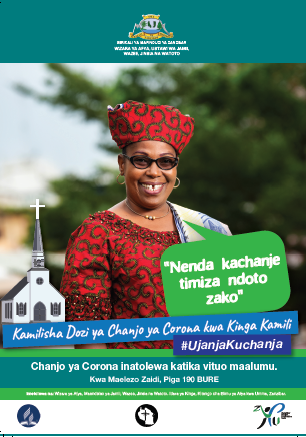
- Improving COVID-19 Vaccine Demand with Trusted, Community-Based Vaccinators
- The Power of Religious Leaders to Drive COVID-19 Vaccine Demand Zanzibar
- Moonlight Community Cinema to Combat Low Risk Perception of COVID-19 in Makueni County, Kenya
- Leveraging Local Insights to Drive COVID-19 Vaccine Uptake in Njombe, Tanzania
Impact and Outcome
Boost Flagship Fellowship Impact
In Q3-Q4 of 2022, Boost partnered with People, Power, Health to perform a tracer study to evaluate the impact of Boost’s core programming in adaptive leadership and community activation on both cohorts of fellows. The study included a survey to gather quantitative and qualitative data, as well as follow-up in-depth interviews with a sample of Fellows. Of the nearly 70% of Boost Flagship Fellowship alumni who participated in the survey, over 85% noted that they continue to draw on the tools, skills, and concepts from the program.
Impact on immunization goals, projects, and teams
Through this survey we see that community activation and adaptive leadership are impacting fellows’ immunization goals. Eighty-eight-point nine percent (88.9%) of respondents answered ‘yes’ to the question of ‘have the skills of community activation and/or adaptive leadership helped you to improve your immunization goals?’ There were many examples shared to illustrate this impact, many of which are aligned with the BRAVE framework (particularly boosting coverage and valuing communities). Fellows are utilizing their community activation and adaptive skillsets to improve teamwork and team effectiveness, to better understand the underlying challenges and therefore come up with creative strategies to overcome them, to build relationships with community members who are critical to vaccine acceptance, to counter vaccine hesitancy, and more. These activities are in service of improving vaccine coverage and reaching hard-to-reach populations including nomadic groups, people living in security-compromised areas, and island communities.
Fellows are also importantly exercising leadership by training others in these skillsets both formally and informally and are modeling the practices within their spheres of influence, for example with those they supervise or with other stakeholders. Fellows are applying the relevant skills in communities and integrating skills with their colleagues. Below are many survey responses from fellows’, as it is most meaningful to hear the impact of the fellowship stated in their own words.
Translating Knowledge and Skills Into Results
- “The skills of community activation/adaptive leadership have assisted me to identify the gender barriers that hinder immunization coverage and Equity in my district.”
- “Community activation has helped the immunization service to improve coverage while adaptive leadership has reduced the non-compliance and zero-dose and many other adaptive issues.”
- “I used community activation skills and organized zoom meetings for district EPI coordinators who saw the need to look for immediate root causes at challenges at the district level, drew plans and worked on them. This resulted in remarked improvement in our routine immunization coverage.”
- “The public narrative and storytelling helped me to communicate values and ideas to people at all levels so the idea is diffused and people are adopting the change. There is more trust.”
Relationships and Trust
In community activation, relationships are the glue that enable commitments that lead to action and change. Relationships build the necessary trust for others to join you in action. Most of the fellows share examples of deepening existing relationships (either in communities or with their staff/colleagues) or strategically building new ones in order to improve their immunization goals. Eighty-five percent (85%) of fellows said they have built new relationships in their organization or in the community since the fellowship ended, and 70% said they have invited or recruited new people into immunization campaigns or other projects they are working on. Two examples illustrating intentional relationship building are below.
- “Currently, my immunization staff are experiencing very high COVID-19 vaccine hesitancy. With my acquired skills in relationship building, I am able to accompany them to the most hesitant communities for engagement. We built relationships with individuals and groups of people who initially rejected vaccination. With one-on-one interaction, we were able to identify the opponents, competitors, and valuable resources that we leveraged to improve the vaccination coverage.”
- I visited a remote hard-to-reach and marginalized community for a compound meeting and during my interaction with the women, they shared their problems and the changes they want to be made. I started the relationship to assist them to know how to use the resources they have to get power and acquire what they want. The relationship has impacted the immunization campaigns positively because the community is no longer neglected, missed children are now reached and vaccinated during campaigns and women now fully [participate in] immunization activities.”
Stepping Into Leadership
Adaptive leadership and community activation operates on the premise that leadership is a practice and not a position and that there are leadership moments and opportunities available to all, regardless of whether they are in a position of formal leadership. However, many Fellows are in positions of formal leadership. For those who lead teams, they described how the Fellowship influenced their approach to team leadership:
- “I have become more empathetic in how I deal with colleagues I supervise. I have also been able to coach people to complete difficult tasks and one of my team members has grown so much and based on my recommendation he now heads a team of his own.”
- “Team building skills acquired through the fellowship are helping to influence the team positively to achieve organizational goals. I was able to know the strength and weakness of each team member. With that I assigned roles and duties based on the potentials and capabilities of the people. I was able to organize team meetings effectively through physical contact and virtual with the use of the modern technology.”
- “After my learning journey with Boost Community and People Power Health, my leadership style changed. I’m more “open minded” and able to listen and motivate people to join actions. Also, capable to help colleagues to initiate new projects.”
Insights from Colleagues
As part of this tracer study, a brief, optional survey was sent to colleagues of Fellows to learn more about how the fellowship is impacting individuals and teams and how the skills of the fellowship are spreading. All seven respondents reported noticing differences in how their Fellow colleague exercises leadership and participates a team member. Some examples include:
- “His leadership skills are more adaptive. He listens more to his team, uses data for decision making and always leverages individual expertise to achieve a task.”
- “His ability to influence people towards achieving a set goal is exceptional.”
- “She ensures everyone is carried along.”
- “Her resilience and ensuring tasks are done excellently well and in due time.”
- “Working independently with his support build up my innovative competence.”
While we can’t generalize about the entire cohort of fellows from a small sample of colleague feedback, it is exciting to see examples of Fellows enabling their colleagues to build up their skills to achieve their goals, supporting others to take on leadership roles, leading adaptively and thinking through challenges, and working together to achieve shared goals.
Looking Ahead
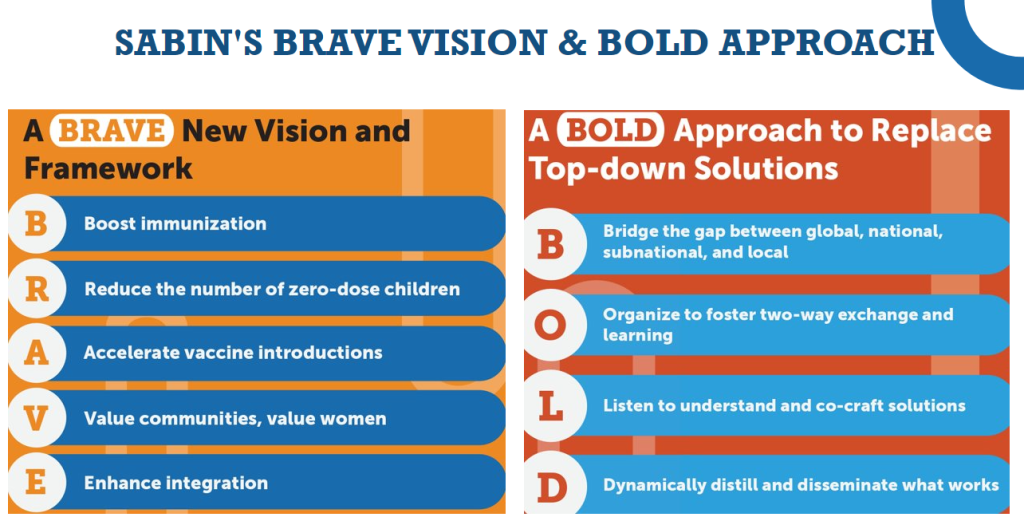
Building on the momentum from 2022, we are excited to continue to provide support to our growing community of almost 3,500 immunization professionals. We are grateful for your participation and collaboration in the Boost Community, and we look forward to serving you in 2023 and beyond.
Beginning in 2023, Sabin adopted a BRAVE vision and BOLD approach to boost and sustain global immunization. Our new BRAVE vision and strategy focuses on the most critical problems and principles facing the immunization ecosystem, especially as we start to understand the devastating aftermath of a generational pandemic. BRAVE guides and garners momentum around Boosting coverage, Reducing the number of zero-dose children, Accelerating vaccine introductions, Valuing communities and women, and Enhancing integration. Sabin understands that the individuals closest to the challenges we face in immunization are also best positioned to identify the solutions. Our BOLD approach operationalizes BRAVE by Bridging gaps between global and local; Organizing two-way exchanges and learning; Prioritizing Listening to understand and co-craft solutions; and; Dynamically distilling and disseminating what is and what is not working well in communities.

